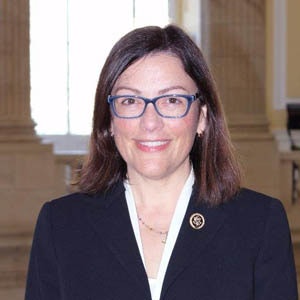WASHINGTON — If students were exposed to STEM earlier in life, the nation’s cybersecurity could be improved, a U.S. Congresswoman said Thursday at a forum called “Defending The Web.”
“We need to make sure our schools have all the tools that they need so that students are getting a great education in science, technology, engineering, math,” said U.S. Rep. Suzan DelBene (D-Washington).
 U.S. Rep. Suzan DelBene
U.S. Rep. Suzan DelBeneHoward University President Wayne A.I. Frederick revealed that Howard University Middle School — which is located on the university’s campus — is up for the challenge and plans to add a STEM high school soon and revamp the middle school curriculum to focus more on skills that could help in the realm of cybersecurity. Ninety-five percent of students that enter the historically Black institution’s middle school go on to college, and 65% of those students study a major within STEM.
“The next step of what we’re going to do is to make sure they’re getting programming and coding skills at the middle school level,” Frederick said.
Frederick and Montgomery College President DeRionne Pollard both said their institutions help make the field of cybersecurity more diverse because their institutions attract traditionally underrepresented students, many of whom go on to study cybersecurity.
Frederick noted that Howard has “heavily invested around” in bringing diversity to STEM fields. He noted that the university partnered with Google to offer students a 12-week internship at the end of May called Howard West in order to promote STEM at Howard.
Asked about the need to encourage STEM in rural areas to increase diversity, DelBene noted that a school in Redmond, Wash., in her congressional district, has begun to train students in coding and technology. DelBene encourages mentorship for students in rural areas to prepare them for college and in the future.
“Whether it’s with communities of color or with women part of it is when folks get involved with technology sometimes they haven’t seen career paths there,” said DelBene. “So it’s also about making sure that when folks do are able to move forward we have that mentorship that available that we look at the culture of organizations and make sure that they’re open in providing opportunities and the needs.”
Thursday’s forum comes at a time when the importance of cybersecurity is paramount. Indeed, President Donald Trump’s administration is embroiled in a controversy over concerns that it colluded with Russian hackers who accessed and leaked e-mails from his Democratic rival in the 2016 presidential election.
Angela McKay, senior director of Cyber Security Policy at Microsoft, stressed that all students should learn about cybersecurity irrespective of their major in order to improve cybersecurity in the US.
Pollard noted that Montgomery College offers classes for employees to retrain themselves to ensure they are up to date within the field of technology. “Most of our work that we do with companies right now is retraining their existing workers and then having an ongoing professional development.”
Kathy Warden, president of Northrop Grumman Mission Systems, encourages government officials, schools and companies within cybersecurity to “be in this together” and encourage students to join the field. The decrease in interests within cybersecurity, and constant cyber-attacks around the world has led to the high demand of students in STEM.





















